Migration
Studying Climate Change and Other Causes of Migration at its Origin
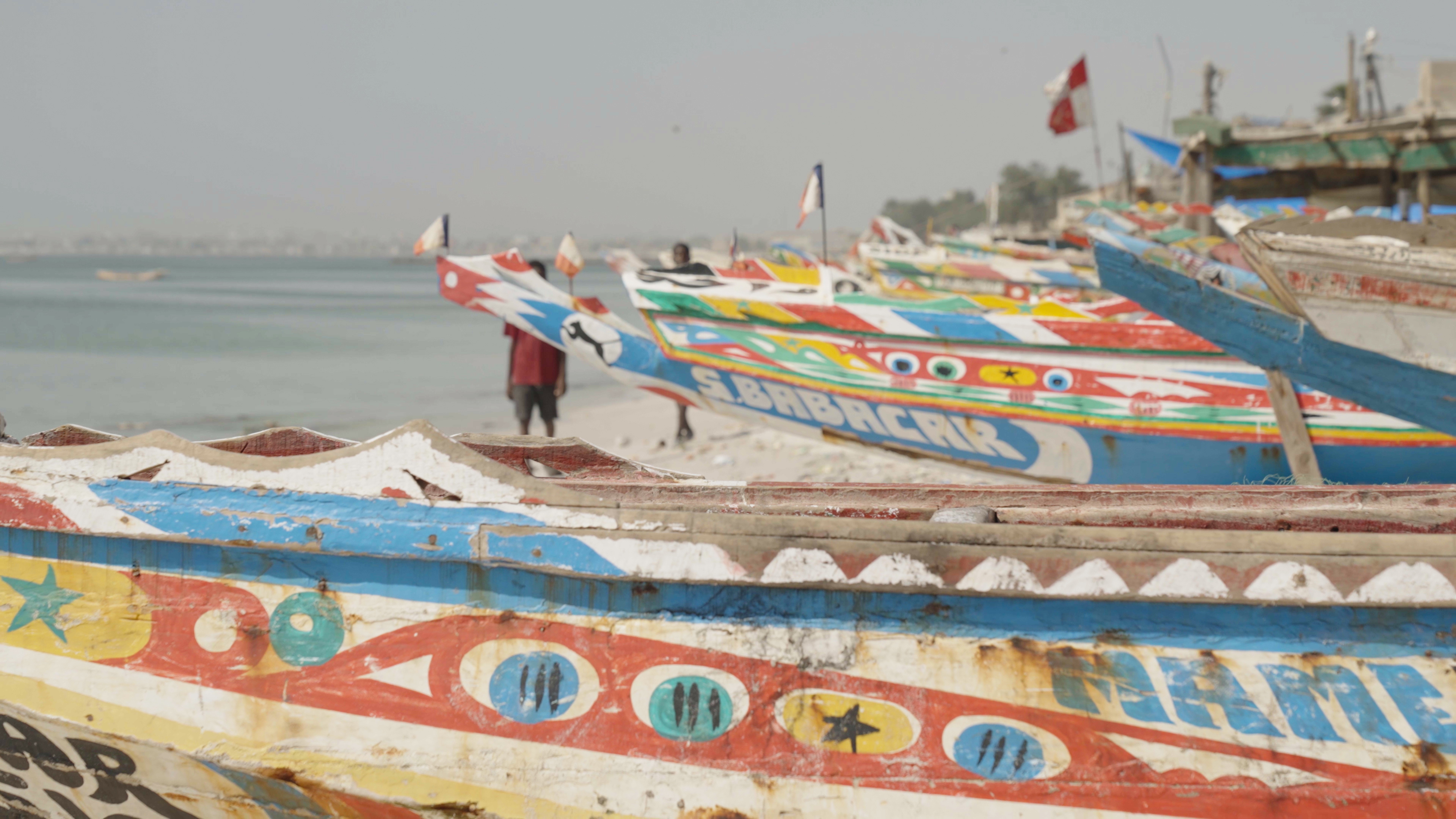
The Migration Policy Group in Senegal, November 2022
© FNF MadridIn the framework of a project that is now approaching its third anniversary, the FNF Madrid office, alongside the Dakar office, organised a study trip to Senegal, in order to investigate and better understand the root causes of migration in the region, with special focus on climate change. The trip was part of the Migration Policy Group which the Mediterranean Dialogue of the Madrid Office has been cultivating and strengthening for the past couple of years. Additionally, it served as fieldwork for a study being published in collaboration with the European Institute of the Mediterranean (IEMed), in which climate change will be observed as a cause for flight in the Sahel and Maghreb regions, as well as West Africa. In this last expedition, new and recurring participants of our Migration Policy Group were able to meet with an array of diverse entities that deal with migration in Senegal. From meeting with members of the Senegalese parliament, and UN officers, to hearing the first-hand account of now-returned migrants, our team of experts heard about the phenomenon formally labelled as the “African Diaspora” from all possible angles.
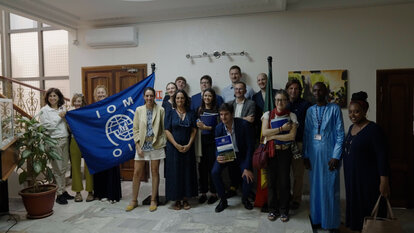
The Migration Policy Group in Senegal, November 2022
© FNF MadridThe case of Senegal is especially interesting when discussing migration. Indeed, the country is an origin, transit and destination country for migration. Much clandestine immigration to Europe begins in Senegal mainly because of poor employment opportunities within and around the country. We spoke with many members of civil society who wanted to migrate, but also who had returned to Senegal after having attempted and succeeded in arriving in Europe. Despite their knowledge of the high risk of fatality linked to the trip by boat to the Canary Islands (it is one of the closest European shores from the country), they would rather lose their lives than keep on living in their current conditions, as “hunger is stronger than fear.” The situation in neighbouring countries, such as Guinea or Mali, is much worse, especially regarding the political rule, as they have severely insecure political regimes. This is why, within West Africa, Senegal is also a destination country for many. This is supported by figures gathered from the UN International Organisation on Migration (IOM), which we met with, which show that 60-80% of migration in West Africa is in fact intraregional.
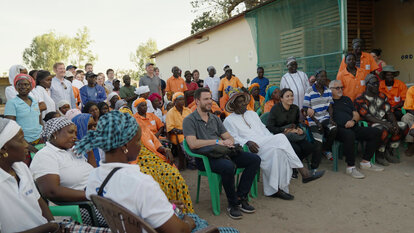
The Migration Policy Group in Senegal, November 2022
© FNF MadridOrganisms such as the IOM, or the EU delegation in Senegal, look at the matter of migration from a perspective which is not commonly present in European political discourse. Naomi Shiferaw, from the IOM, communicated to us the idea that “migration is not a problem to be solved, but a human reality to be managed.” Also from the IOM, Valeria Fallaschi, Chief of mission in Senegal, reminded us that correct terminology, outlook and discourse are not trivial matters to be overlooked. She used as an example the increasingly popular term “potential migrants,” which is very harmful to the civil society communities of West-African countries, and that is why the IOM is heavily advocating against its incorrect use in rhetoric on migration.
Moreover, Christoph Pelzer, Attaché of the EU delegation in Senegal specialising in human trafficking and migrant security, strongly emphasised that they work with a perspective which views migrants as victims in this situation, therefore working towards their safety and well-being. Instead, they work against the systems and organised crime circles that take advantage of their circumstances. After the discussions with these supranational entities, it was more than apparent that discourse concerning migration is an essential piece of the puzzle.
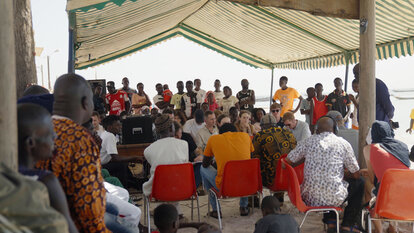
The Migration Policy Group in Senegal, November 2022
© FNF MadridAt the Dakar FNF office, our group was able to meet with Cellou Dalein Diallo, former Prime Minister and current opposition leader of Guinea, who offered us a broader West-African outlook, including, but not restricted to, migration. He illustrated the political situation in his country, the very crucial issue of youth employment, and reminded us of the need for democratic values based on freedom that are still to be disseminated effectively in this region. Mr Diallo also highlighted that “Africa will play a key role in the development and balance of the world,” which is why he insisted that cooperation between the EU and countries in West Africa is crucial. However, this notion came with a warning, as he pointed out that any financial grant received in West Africa should be better monitored to ensure it is used to actually contribute to the economic, social or environmental development of the region.
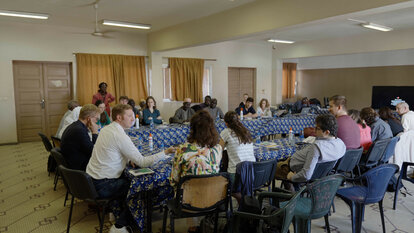
The Migration Policy Group in Senegal, November 2022
© FNF MadridOne of the most touching and important parts of our study trip were the visits to the departure sites for clandestine immigration. We saw several of these during our time in Senegal, where we talked with associations and groups of returned migrants, who offered us first-hand accounts of the many stories which fully encapsulated the horrors that migrants face when reaching, or attempting to reach, Europe. Many young people opened up, at times hesitantly, with their experiences of inhumane conditions on unstable boats, hostility when reaching the shores of Tenerife or Gran Canaria, and the deaths of close friends and relatives that they have endured. One common thing between them was that, notwithstanding their awareness of the high risk of danger connected to their sea journey to Europe, if they had the economic means, they would undoubtedly try to emigrate again. “Barça wala barsakh”, which in Wolof translates to “Barcelona or death,” was the impactful motto that they were repeating.
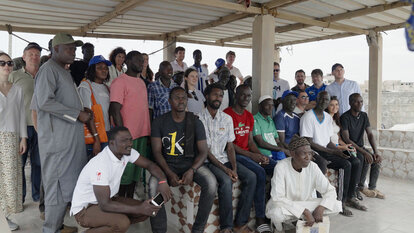
The Migration Policy Group in Senegal, November 2022
© FNF MadridAlthough we may unconsciously think that observing the migration phenomenon from western media is enough to give us an accurate enough representation of the question, we saw immediately that this was not the case. This study trip to Senegal was paramount in giving all of us a holistic understanding of why, when, how and what happens regarding displacement in West Africa. The addition of the human aspect when we spoke with returned migrants was, furthermore, irrefutably much more impactful than reading a story could ever be. Apart from this, the team of researchers that joined us in the context of the collaborative study with the IEMed collected countless facts from the ground, especially regarding common perspectives on migration and climate change as its leading cause. These findings and the impressions left on our team will not be easily forgotten, thus causing a more knowledgeable and empathetic perspective on issues relating to migration. While this trip is a great step towards more comprehensive migration policies, it is indeed a step, hence, we are looking forward to making many more with our Migration Policy Group.
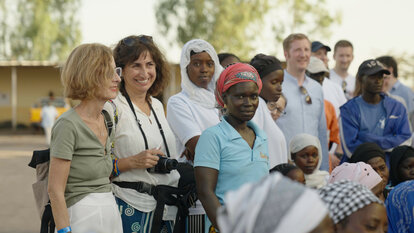
The Migration Policy Group in Senegal, November 2022
© FNF Madrid